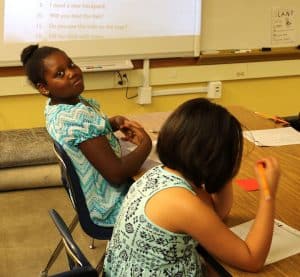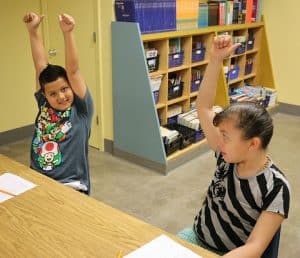
Second graders improve their literacy skills with the four-week Summer Bookworm program each summer at Earl Boyles.
The Summer Bookworm collaborative reading program at Earl Boyles Elementary in southeast Portland just finished its fifth summer as a skill-building resource for some of the school’s earliest readers. It’s become a key component of the growing culture of literacy at the school, which supports a variety of language-rich activities and programming throughout the school year.
Having served nearly 120 students since 2012, Summer Bookworm engages kids entering second grade and helps them return to school with stronger literacy and comprehension skills. This targeted intervention is especially important for low-income children who are at greater risk of falling behind in skill growth over the summer — what researcher’s call the “summer slide.”
Skill gaps that develop at the rate of two to four months per year result in significant achievement gaps over time compared to middle- and upper-income students, who typically continue to gain skills during summer breaks.
Poor reading skills, when combined with other factors like poverty or housing insecurity, negatively impact academic achievement. The Summer Bookworm program helps young learners meet crucial third-grade reading targets that are strong indicators for future academic success. Third-graders who don’t read at grade level are four times more likely to exit high school without graduating.
Summer Bookworm began five years ago as an Early Works collaboration to bring in programming and other contributions from entities and groups outside the school and the David Douglas School District. The Schools Uniting Neighborhoods (SUN) program coordinates the summer reading activities at Earl Boyles (among a host of other summer enrichment opportunities) and connects families to the program based on teacher referrals. Reading Results, extending their year-round reading intervention program, provides skill assessments, Common Core-aligned curriculum, and paid tutors from the school and community. Start Making a Reader Today (SMART) contributes volunteer tutors who offer one-on-one instruction and support for students. The Children’s Book Bank donates books.
Jennifer Samuels from Reading Results says participating students typically make four to five months of reading gains in a program like Summer Bookworm. “They come back to school stronger than when they left and they don’t experience the summer slide.”

Improving language and literacy: “Thumbs up if you know the word!”
Beyond gains in reading skills, the program builds reading confidence and comprehension, increases positive engagement with the school, tutors, and teachers, results in improved reading at home, and helps build the foundation for continued lifelong learning.
“It’s also an opportunity to offer parents information about the summer slide,” says Michelle Gilmore from SMART, “and encourages their participation in improving literacy.” Gilmore says there is great enthusiasm for the program; students and SMART’s volunteer tutors really enjoy the experience.
Ericka Guynes, principal at Earl Boyles Elementary, says the partnerships with other organizations focused on reading and literacy have been essential. “A coordinated vision for improving literacy before third grade and unity around this effort has had a tremendous impact on the school. Summer Bookworm is building skills for individual students and improving how our school community views literacy.”
Other schools have noticed the culture shift at Earl Boyles and recognize the importance of summer literacy efforts to improve grade-level reading. These efforts also require resources, partnerships, and a continuous commitment to keeping literacy activities central to school culture.
Guynes reminds that intensive interventions like Summer Bookworm are effective, require hard work, and still don’t reach all the kids in need. “It’s important to stay energized about reading and keep families and students engaged in literacy efforts throughout the year. I would love to see summer reading programs engage more kids in more schools to keep us moving forward on literacy gains.”
